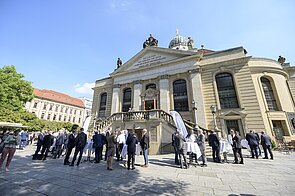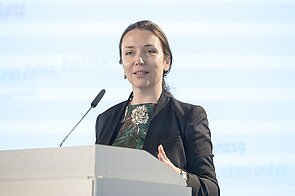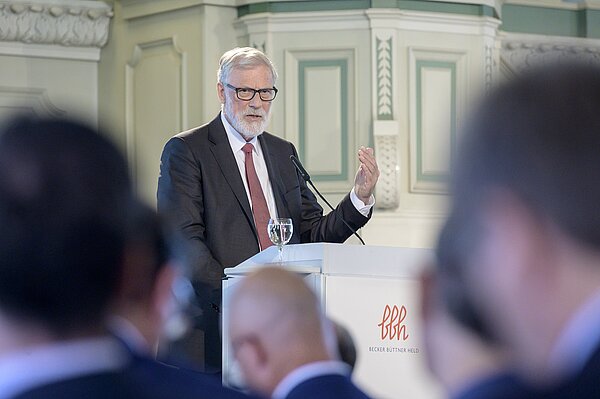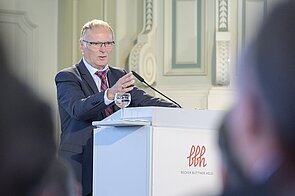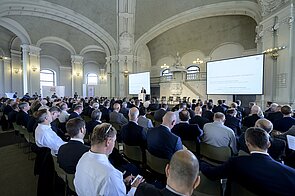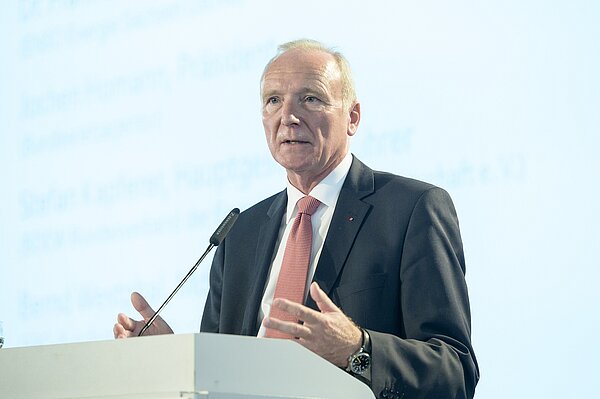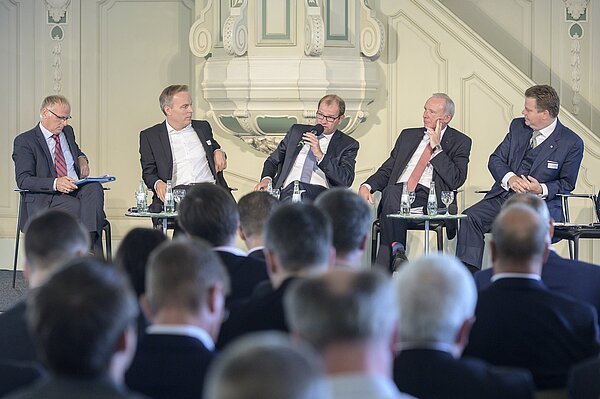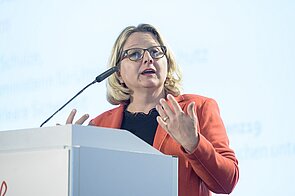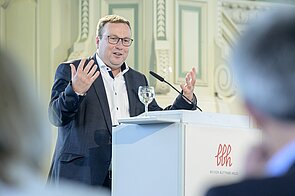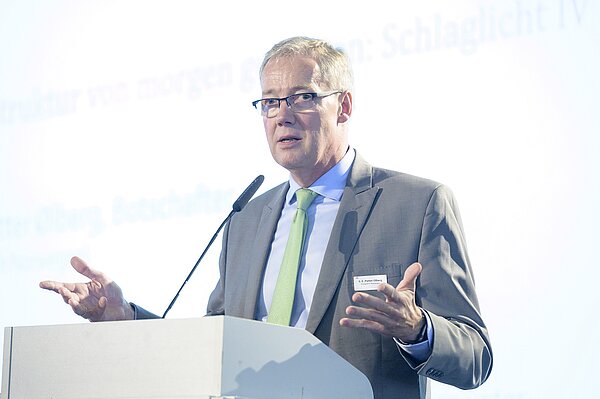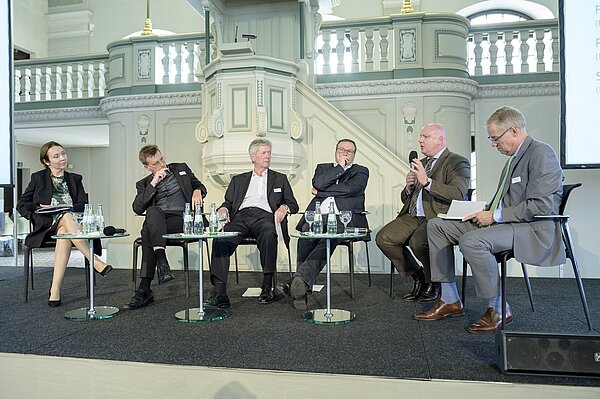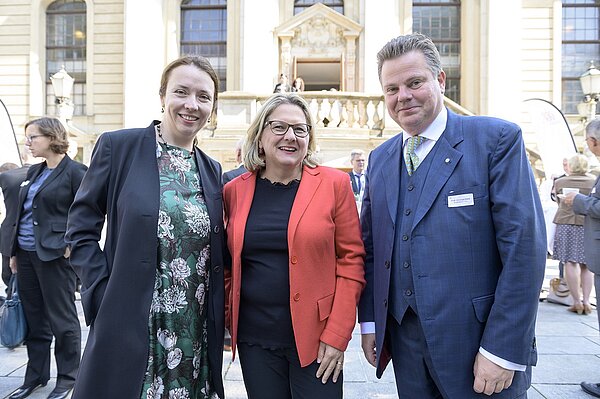Shaping the infrastructure of tomorrow – BBH’s annual conference 2019
‘Infrastructure’ is a term the scope of which is not understood intuitively. It is necessarily abstract because its function is to link different worlds: energy, mobility, climate and housing. The term unites these worlds under its umbrella without being limited to them and provides a new, holistic perspective on different areas of the economy. Bringing together conceptually what belongs together. This was also BBH’s ambition for its annual conference 2019 titled ‘The infrastructure of tomorrow’, which was held in Berlin on 11 September and moderated by BBH partners Prof. Dr. Ines Zenke and Prof. Christian Held.
At the beginning, Ines Zenke pointed out that the term ‘infrastructure’ occurs 74 times (in various contexts and combinations) in the coalition agreement between CDU/CSU and SPD for the 19th legislative period. The agreement also refers to a “continuation of massive investments into the infrastructure”. “The priorities are correctly placed”, said Zenke. “Shall we put our feet up again? This is highly unlikely, given the economic reality.”
Infrastructure as a service of public interest
In the first keynote address of the event, Rainer Robra, State Minister and Minister for Culture of Saxony-Anhalt, made it clear that “infrastructure is a service of public interest”. According to Robra, this also means that no parts of the population must be left behind in terms of infrastructure. Robra emphasised in this regard that the infrastructure would, in the future, be defined less at a local level but take on an international dimension. However, policymakers and planners, especially in the world of energy, require a lot of persistence in the face of the stagnant expansion of renewable energy. This also applies to the State of Saxony-Anhalt, which has no less than 2,830 wind turbines in operation, thus generating 33% of its electricity from wind energy.
Times of change for the energy industry
Jochen Homann, President of the Federal Network Agency, agreed: Recently, renewable energy has not developed well as tenders are massively undersubscribed, the price level stagnates and competition is lacking. If we want to reach the 65% goal, tenders must not continue this way: Action is needed. Achieving an alignment of renewable energy and grid expansion by stopping the expansion of renewables was no solution. It would be more effective to improve regional management on the basis of the reference yield model and, as the case may be, contributions to the costs of constructing the grid connection.
Homan also emphasised in the second keynote address of the BBH conference that grid expansion is indispensable, stating that the reason why renewable energy is currently curtailed is not because of a lack in demand but because the electricity cannot be transported, which leads to congestions in the electricity grid. The solution to the 5,400 GWh of renewable energy curtailed per year as a result of feed-in management measures is grid expansion and the integration of renewables into redispatching. As regards sector coupling, Homan remains sceptical as it presented no real alternative to grid expansion – after all, the electricity is needed in the South. There were currently no overcapacities of electricity; only if the share of renewable energy reached more than 65% would it be possible to speak of excess capacities. Therefore, converting the electricity and consuming it in the North was currently no solution.
The subsequent panel discussion, which focused on energy, centred on the question as to the role that hydrogen will play in the future. “Should hydrogen be taken into account also in, for example, the German Energy Industry Act?” asked Prof. Christian Held. Bernd Westphal, Member of the Bundestag, is convinced that the best technology will prevail in the competition of innovation. However, further action by the legislator may be required to create an investment-friendly environment. In any case, it should not be left to the courts to make decisions in this regard. Stefan Kapferer, Chairman of the General Executive Management Board of the Federal Association of the German Energy and Water Industries (BDEW), remarked that the infrastructural requirements are given too little attention in the political discussion. The coal phase-out was feasible but required a focus on infrastructure. After all, even if PtX products are produced abroad, the necessary infrastructure for transport was needed in Germany. In this context, Dr. Frank Brinkmann, Chairman of the Executive Board of ENSO Energie Sachsen Ost AG, also referred to “anticipatory thinking” being required when it comes to infrastructure.
Storage options are becoming ever more important in the quest to make the electricity system more flexible. At the moment, however, hardly any storage facilities are being built, as they are not economically attractive. This is why Prof. Christian Held asked: “Where are the investments into storage solutions?” By contrast, Jochen Homann insisted on a level playing field with other flexibility options, into which storage solutions would have to fit.
Climate protection: opportunity for and driver of the economy
Svenja Schulze, Federal Environment Minister, spoke about climate protection as a driver of tomorrow’s infrastructure. “Infrastructure keeps our country running and forms the basis for our economic success. Only if we produce the things of the future will we remain world export champion,” said Schulze. Long-term investment and planning security were needed in this regard. To achieve this, she tabled a climate protection act. The targets were clear, now the individual ministries needed to explain how they intend to reduce emissions in their respective fields. This package of measures is due on 20 September. A CO2 solution must be unbureaucratic, allow for quick implementation and be socially responsible. In principle, there were a lot of arguments in favour of including the previous non-ETS areas into the European emissions trading system. However, this could not be implemented in the short term. A national system is being discussed as an alternative. But where does this leave the trade if both the upper and lower limits as well as the price are determined in advance, Schulze asked the audience.
Climate neutrality was the objective of the Federal Government; to achieve it, the necessary infrastructure must be put in place. Ms Schulze stated that while this requires major changes, it also presents a major opportunity, which will benefit everyone in the end. In a further keynote address, Oliver Krischer, Member of the Bundestag and deputy chairman of the parliamentary group Bündnis 90/Die Grünen, insisted that speed was of the essence. It was high time for concrete action in regard to climate protection and the coal phase-out. Some companies today were further advanced than the Federal Government as regards the implementation of concrete measures. In this regard, he emphasised that climate protection, the economy and the industry are, after all, not mutually exclusive.
‘Carrot and stick’ approach in the area of mobility
His Excellency Petter Olberg, Ambassador of the Kingdom of Norway, confirmed this in his keynote address, citing the example of Norway. Electricity consumption in Norway was very high as heating is usually based on electricity, with 98% of the electricity being generated from hydropower. Norway regards oil and gas largely as export goods. According to Olberg, potentials for further reducing greenhouse gas emissions are to be found in the transport sector. Electric vehicles have been heavily promoted in Norway for a number of years in that they were made tax- and toll-exempt. As a result, the demand in e-vehicles has risen such that 50% of all vehicles newly registered are now electric. However, as regards hydrogen, things were moving much more slowly, which is due, among others, to the lack of infrastructure.
This was followed by a final panel discussion on the subject of mobility. To which extent can Germany learn from Norway? Folkert Kiepe, former member of the German Association of Cities and partner of counsel at BBH, is convinced that push and pull measures within the meaning of a bonus-malus system belong together. The promotion of e-vehicles so far had virtually no effect, said Christian Hochfeld, Executive Director of Agora Verkehrswende. Nothing can be achieved without investments and the transport sector is no exception in this regard. Christian Hochfeld demanded that more money be invested into the charging infrastructure. This could come from a toll system that is to be newly designed. Hochfeld was sceptical about a €365-ticket as it would not reflect the real costs of local public transport but give the false impression that transport did not cost anything. In reality, however, the local public transport sector had its back to the wall. Folkert Kiepe agreed, deploring that there was no financial basis at all for expanding and renovating local public transport. Prof. Dr. Carsten Kühl, Director of the German Institute of Urban Affairs, pointed out that, in general, there can be no climate protection without sacrifice.
“Every country must find its own way,” said His Excellency Petter Olberg in conclusion of the BBH conference. This implies the freedom and sovereignty of a state but also an impetus: Finding a way is the duty of every country. This also applies to the Federal Government, for 20 September and beyond.
Becker Büttner Held is a leading provider of advisory services for energy and infrastructure companies and their customers. Energy and supply companies, particularly public utilities, municipalities and local authorities, industrial companies and international groups are among its core clients. BBH advises these and many other companies and organisations in all legal and tax matters and also assists them with business and strategic advice.
Becker Büttner Held finden Sie im Internet unter www.bbh-online.de, www.derenergieblog.de oder twitter.com/BBH_online.

